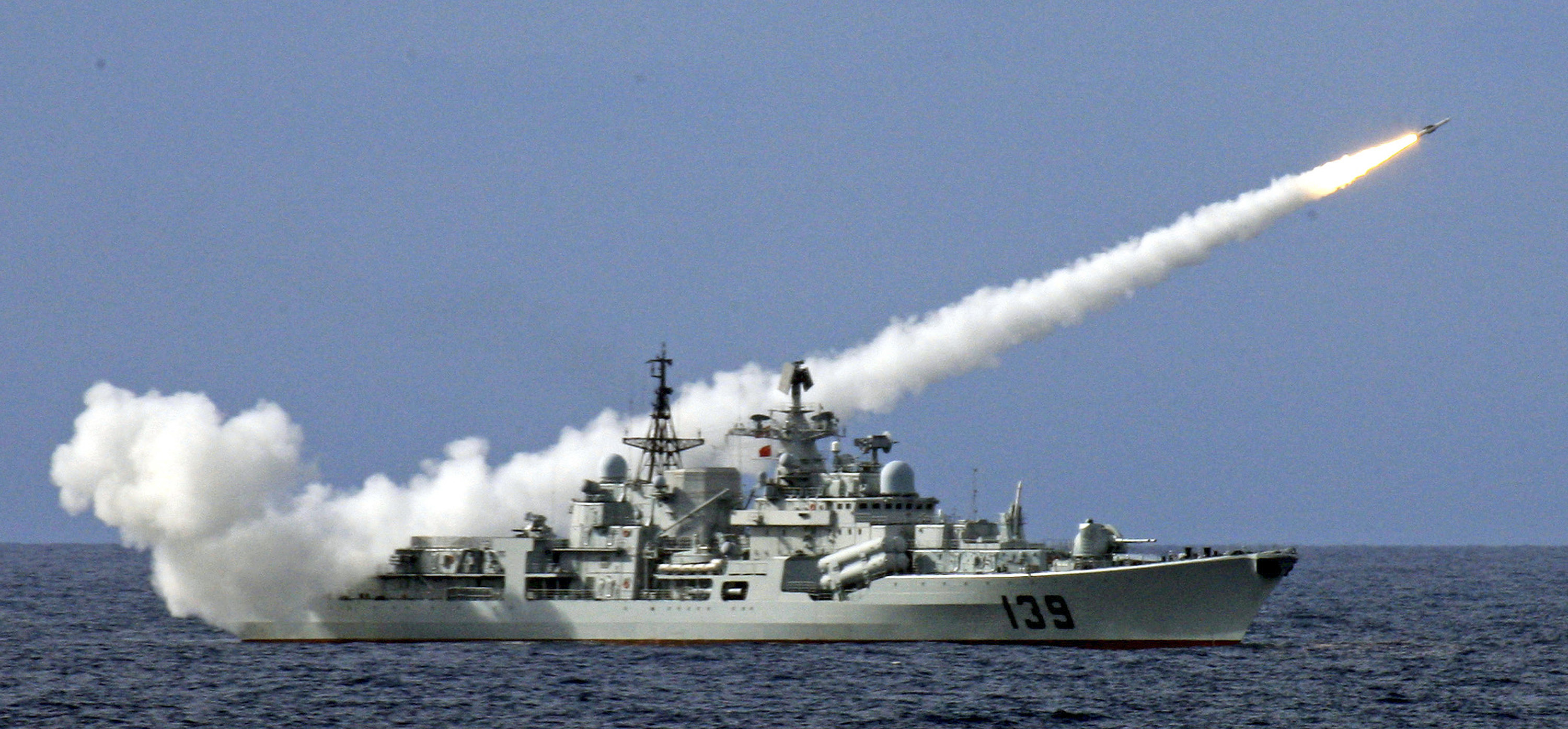This is the real reason China is deploying nuclear missile subs
China's excuse for sending submarines to the South China Sea is a flimsy one. In reality, it has planned this move for decades.

A free daily email with the biggest news stories of the day – and the best features from TheWeek.com
You are now subscribed
Your newsletter sign-up was successful
Last week, The Guardian announced that China was preparing to send its nuclear missile-armed submarines into the South China Sea. China's excuse — that it is merely countering American moves in neighboring South Korea — is a flimsy one, intended to paint China as the victim. In reality, China has planned this move for decades.
The People's Republic of China is in the midst of a territorial grab that has placed itself on one side and virtually all of its neighbors — and the United States — on the other. At stake is freedom of navigation in one of the busiest waterways in the world, and China's plans for fighting a nuclear war.
Lying off the coast of Southeast Asia, the South China Sea is one of the most strategic and economically vital stretches of water in the world. A third of the world's merchant traffic passes through the area. It's also packed with resources, including rich fishing grounds and large reserves of oil and natural gas. The South China Sea functions as a sea border for a number of countries, including China, Vietnam, Malaysia, Brunei, Indonesia, the Philippines, and Taiwan.
The Week
Escape your echo chamber. Get the facts behind the news, plus analysis from multiple perspectives.

Sign up for The Week's Free Newsletters
From our morning news briefing to a weekly Good News Newsletter, get the best of The Week delivered directly to your inbox.
From our morning news briefing to a weekly Good News Newsletter, get the best of The Week delivered directly to your inbox.
In recent years, China has laid claim to roughly 90 percent of the South China Sea, trampling competing claims by her neighbors. China has used dredging to turn several shoals, reefs, and islets into bustling military outposts.
During the Cold War, the Soviet Union and the United States split their nuclear weapons between long-range missiles, bombers, and missile-firing submarines. Diversifying ensured that it would be difficult to destroy a country's nuclear stockpile in a single, surprise attack.
The United States, with a powerful navy and technological edge, was less restrictive on where it could send its submarines. The Soviet Union, on the other hand, had inferior submarines, shorter-range missiles, and a less capable navy. In order to protect their missile submarines, the Soviets established two "bastions" — one in the Atlantic and one in the Pacific — adjacent to their territory where they could be better protected.
As a rising power, China is roughly charting the same course the Americans and Soviets did 50 years ago. China has land-based missiles, bombers, and missile submarines. And China is establishing its own bastion — in the South China Sea. This sea grab is a logical response to China's strategic dilemma.
A free daily email with the biggest news stories of the day – and the best features from TheWeek.com
China's coming submarine deployment is allegedly in response to the deployment of the American THAAD anti-missile system in South Korea. While it is true that the U.S. is deploying THAAD on the Korean peninsula, the system can only be used against missiles targeting South Korea — coming from China's ally, North Korea. China's explanation is designed to make Beijing look like the victim. But China, which has its main submarine missile base adjacent to the South China Sea, has been preparing to sail its missile submarines there for years.
China's aggression in the South China Sea is not likely merely for aggression's sake, or the result of a rising power feeling its oats. China is acting out of strategic necessity, something even more dangerous because it feels it is doing something because it must, not simply because it can. The ruling Chinese Communist Party has made the calculation that the strategic benefits — having a safe location for its nuclear missile submarines — outweighs the negative attention the country is receiving worldwide.
What does that mean? It means that Beijing is not going to back down. Chinese nuclear weapons, which are the ultimate guarantor of Communist Party rule, are involved, and anything crucial to the survival of the regime is non-negotiable. Barring a new nuclear strategy — perhaps one that rules out submarines and relies on land-based missiles hidden in tunnels — controlling the sea is a must. Beijing has access to other stretches of the Pacific, but they can be easily accessed by traditional rivals including Taiwan and Japan. The South China Sea, for example, is adjacent to a number of relatively poor, weak states.
At the same time, the United States and its regional allies are lining up to contest China's sea grab. At stake for the allies is having an expansive China on their doorstep and the loss of freedom of navigation in an essential waterway. From Washington's point of view, losing control of the South China Sea would be a blow to its credibility as a superpower. Better to push back against Beijing now, while the country is comparatively weak and before China's neighbors become resigned to the new reality.
Would it be better to informally cede control of the South China Sea to China, much the way the U.S. has de facto control over the Gulf of Mexico? Unfortunately, no. American control of the Gulf of Mexico doesn't come at the expense of other nations, while China is running roughshod over its neighbors. Also, while China may be acting out of necessity now, American weakness could embolden China to make strictly elective territorial grabs in the future. There is no easy way to placate China.
Facing off in the South China Sea are two sides, both doing what they think they must. It's a dangerous combination, with no room for negotiation or backing down. Expect to hear much more about this faraway stretch of ocean for years to come.
Kyle Mizokami is a freelance writer whose work has appeared in The Daily Beast, TheAtlantic.com, The Diplomat, and The National Interest. He lives in San Francisco.
-
 Can London’s pie and mash shops make a comeback?
Can London’s pie and mash shops make a comeback?Under the Radar Traditional East End eateries are on the ‘brink of extinction’ – but a younger generation is giving the Cockney cuisine an unexpected boost
-
 Josh D’Amaro: the theme park guru taking over Disney
Josh D’Amaro: the theme park guru taking over DisneyIn the Spotlight D’Amaro has worked for the Mouse House for 27 years
-
 What happens now that the US-Russia nuclear treaty is expiring?
What happens now that the US-Russia nuclear treaty is expiring?TODAY’S BIG QUESTION Weapons experts worry that the end of the New START treaty marks the beginning of a 21st-century atomic arms race
-
 Epstein files topple law CEO, roil UK government
Epstein files topple law CEO, roil UK governmentSpeed Read Peter Mandelson, Britain’s former ambassador to the US, is caught up in the scandal
-
 Iran and US prepare to meet after skirmishes
Iran and US prepare to meet after skirmishesSpeed Read The incident comes amid heightened tensions in the Middle East
-
 Israel retrieves final hostage’s body from Gaza
Israel retrieves final hostage’s body from GazaSpeed Read The 24-year-old police officer was killed during the initial Hamas attack
-
 China’s Xi targets top general in growing purge
China’s Xi targets top general in growing purgeSpeed Read Zhang Youxia is being investigated over ‘grave violations’ of the law
-
 Panama and Canada are negotiating over a crucial copper mine
Panama and Canada are negotiating over a crucial copper mineIn the Spotlight Panama is set to make a final decision on the mine this summer
-
 Why Greenland’s natural resources are nearly impossible to mine
Why Greenland’s natural resources are nearly impossible to mineThe Explainer The country’s natural landscape makes the task extremely difficult
-
 Iran cuts internet as protests escalate
Iran cuts internet as protests escalateSpeed Reada Government buildings across the country have been set on fire
-
 US nabs ‘shadow’ tanker claimed by Russia
US nabs ‘shadow’ tanker claimed by RussiaSpeed Read The ship was one of two vessels seized by the US military